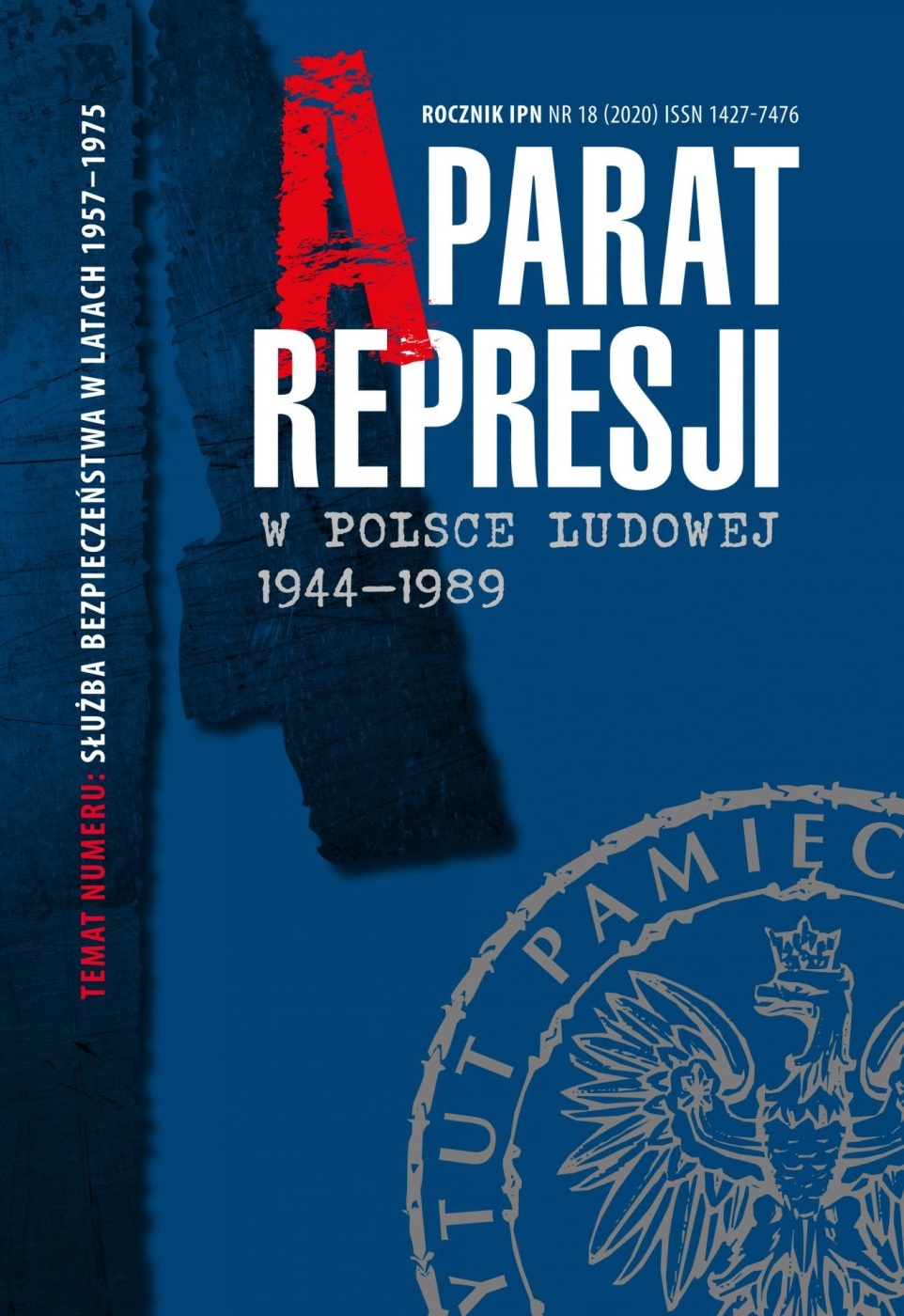The Impact of Soviet Ministry of State Security’s Advisers on Hungarian State Security Investigations, Late 1949–1950. A Case Study
Aparat Represji w Polsce Ludowej 1944-1989, No. 18 (2020), pages: 415-430
Publication date: 2023-03-29
 https://doi.org/10.48261/ARPRL201814
https://doi.org/10.48261/ARPRL201814
Abstract
Examining the first major case the Hungarian state security organ realised after the arrival in late 1949 of the delegation of Soviet state securitym advisers, the paper aims to contribute to a deeper understanding of their activities in Budapest. The paper’s focus includes the everyday working practices of the MGB representatives in cooperation with the local officers, with a special emphasis on the preparation of show trials, an essential element of policy making in the Eastern Bloc during the Stalin era. The case in question is the Standard Electric show trial of February 1950, featuring espionage and sabotage charges against the senior management of an American-owned company in Hungary, including a US and a British citizen, Robert Vogeler and Edgar Sanders. The exceptionally rich surviving archival material and officers’ accounts show that the Soviet delegation, led by Colonel Kartashov and his deputies Polyakov and Yevdokimenko, affected the preparations of the case both indirectly and directly. The examination was handled by a new department established by the advisers within the Hungarian state security organ (ÁVH). The Soviet officers also introduced some fresh working methods, as reflected in the Standard Electric files. Direct involvement by the MGB advisers in the case comprised of a failed proposal to make a substantial number of new arrests; the selection of a detainee from another case, Zoltán Radó, to be used as one of the key figures in the Standard Electric trial; as well as consulting and instructing Hungarian counterparts on a daily basis as to interrogation methods and the desired results. The advisers, whose activities also led to some conflicts with local officers, especially Colonel Gyula Décsi, even took part in some of the interrogations personally and received copies of all confessions made by the suspects. The paper concludes, calling attention to the importance of comparative research into other cases and examples from other countries, that even though the Soviet officers had wide-ranging powers that obviously exceeded a traditional advisory mandate, they did not have complete control over the case as the ultimate direction rested in the hands of Mátyás Rákosi, Hungary’s supreme leader.
Keywords
Węgry • ZSSR • ÁVH • ZSRR • MGB • tajna policja • zimna wojna • epoka stalinowska • proces pokazowy • doradca • dochodzenie Hungary • Soviet Union • ÁVH • MGB • Secret Police • Cold War • Stalin Era • show trial • adviser • investigation
References
Állambiztonsági Szolgálatok Történeti Levéltára (Historical Archives of the Hungarian State Security – ÁBTL), Budapest
Budapest Főváros Levéltára (Budapest City Archives – BFL)
Magyar Nemzeti Levéltár (National Archives of Hungary – MNL OL), Budapest
US National Archives and Records Administration (NARA), College Park, Maryland
Interjú Décsi Gyulával [Interview with Gyula Décsi], conducted by Tibor Zinner, MS, 1984
Baráth M., ‘Szovjet tanácsadó feljegyzése Magyarországról, 1950’ [Memorandum of a Soviet Adviser on Hungary, 1950], Betekintő, 4 (2008), http://www.betekinto.hu/2008_4_barath, accessed 21 Jan. 2021
Baráth M., ‘“Testvéri segítségnyújtás”. Szovjet tanácsadók és szakértők Magyarországon’ [“Fraternal Help”. Soviet Advisers and Experts in Hungary], Történelmi Szemle, 3 (2010), 357–87
Baráth M., ‘Szovjet tanácsadók a magyar állambiztonsági szerveknél’ [Soviet Advisers at Hungarian State Security Organs], in A Nagy Testvér szatócsboltja. Tanumányok a magyar titkosszolgálatok 1945 utáni történetéből [Big Brother’s Miserable Little Grocery Store. Studies on the History of the Hungarian Secret Services after World War II], ed. Gy. Gyarmati, M. Palasik (Budapest: ÁBTL-L’Harmattan, 2012), pp. 55–56
Baráth M., A szovjet tényező. Szovjet tanácsadók Magyarországon [The Soviet Factor. Soviet Advisers in Hungary] (Budapest: Gondolat, 2017)
Gergely J., A Mindszenty-per [The Mindszenty Trial] (Budapest: Kossuth, 2001)
Pécsi V., ‘The Standard Electric Trial’, Hungarian Quarterly, 162 (2001), 85–98
Pünkösti Á., Rákosi a csúcson 1948–1953 [Rákosi on the Top 1948–1953] (Budapest: Európa, 1996)
Szörényi A., "A Standard-per előzményei és előkészítése, 1948–1950 [The Origins a nd Preparation of the Standard Trial, 1948–1950]", unpublished PhD dissertation (Piliscsaba: Pázmány Péter Catholic University, 2012)
License

This work is licensed under a Creative Commons Attribution-NonCommercial-NoDerivatives 4.0 International License.
 Język Polski
Język Polski
 English
English



 PDF
PDF
